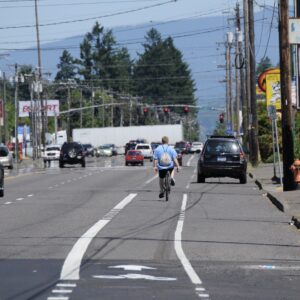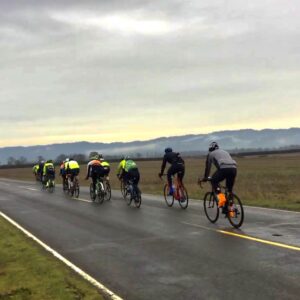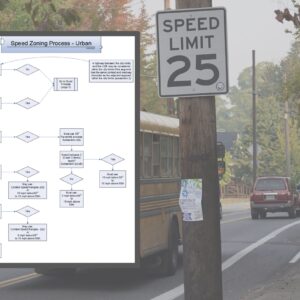Earlier today we reported on a hearing scheduled for a new bill that would give Oregon cities the authority to set lower speed limits on state highways all types of roadways. Now, according to the bill’s sponsor, Rep. Ben Cannon (D-Portland), the bill has been scaled back to only focus on residential streets.
In its original form, House Bill 3150 would have given cities with a population of 100,000 or more the authority to set speed limits on all roads — including state highway arterials — under certain conditions. The language of that bill will now be completely changed in order for it to be the House companion bill to Senate Bill 344. SB 344 is the City of Portland-backed bill that seeks to give cities the authority to set lower speed limits on certain residential streets, a.k.a. neighborhood greenways.
What’s more, HB 3150 will define the term “neighborhood greenway” in Oregon law (something SB 344 doesn’t include).
Here’s the new language:
“Authorizes road authority to designate speed on neighborhood greenway in its jurisdiction that is five miles per hour lower than statutory speed un- der specified circumstances. Defines “neighborhood greenway.”…
A road authority may establish by ordinance a designated speed for a neighborhood greenway under the jurisdiction of the road authority that is five miles per hour lower than the statutory speed.
The road authority shall post a sign giving notice of the designated speed at each end of the portion of the neighborhood greenway where the designated speed is imposed and at such other places on the neighborhood greenway as may be necessary to inform the public. The designated speed shall be effective when signs giving notice of the designated speed are posted.
As used in this subsection, “neighborhood greenway” means a highway* in a residence district that:
- As determined by the road authority having jurisdiction over the highway, has an average volume of fewer than 2,000 motor vehicles per day, more than 85 percent of which are traveling less than 30 miles per hour; and
- Has a traffic control device that indicates the presence of pedestrians or bicyclists.
[*”Highway” in Oregon law is a general term for all public roads and does not refer to freeways.]
For more on designating speeds, see the ORS this bill would amend, 810.180.
Reached on the phone today, an aide for Rep. Cannon said the initial bill language came out of conversations about how to tame speeds on SE Foster Road; but now Cannon feels that starting only with smaller, residential streets is a better first step (not to mention much easier politically) than changing speed limits on major arterials. It also makes sense to partner with PBOT. Having two similar bills will increase awareness of the issue and makes it more likely that one of them will pass.
A hearing for HB 3150 will take place at next Friday (2/25) from 1-3:00 pm in Hearing Room D at the Capitol Building in Salem.
Follow our legislation coverage here.
NOTE: I apologize for all the confusion on this bill. I just edited to story to reflect the fact that in its initial form, HB 3150 would have applied to all roadway types.





I am saddened that Portland is held hostage by ODOT and backwards-thinking people like Matt Garrett, who only think in terms of “throughput” as a metric for streets.
However, Portland has not shown the courage to deal with streets it does have control over, like 39th, so I don’t know if this bill would have helped that much. If we are to fix those streets, it will require a complete rethinking of what the purpose of our public roadways are for, and I don’t see any state or city entity ready to take on that challenge.
What control do you think portland has on 39th? Are you talking about removing the stop signs from the traffic circle? Portland has no control over speed limits, that is why they are championing this.
sharrows.
39th is a perfect example of why the house bill which would have given blanket authority to a city with 100k population was the better choice here. this bill will give portland no added authority over 39th, unless the city can somehow bring volumes down below 2k and 85th percentile speeds down below 30 mph, which i would suppose they have no intention of doing. so what you have still in the toolkit would be sharrows, as spare_wheel suggests — which again, PBoT has made pretty clear they have no intention of doing, as they waste these on side streets — or some serious traffic calming.
As a first step this will be good and hopefully will not be the last.
May this be the beginning of our journey to reclaim our roads from the tyranny of autos and return their use to all to share safely and equitably.
HB 3150 would provide for a reduction:
“…that is five miles per hour lower than statutory speed un- der specified circumstances. …”?
Just a 5mph reduction? That’s not very much. 5mph is the range of latitude I’m been under the impression police officers observe when determining whether or not to issue a citation.
5mph doesn’t seem like enough of a reduction; cities seeking to accomplish greater safety and livability on their streets can’t accomplish much with just 5mph. If it has to be a set figure, at least try for 10mph.
Foster Rd. is not a state highway, and the original wording of the bill would not have given PBOT control of speed on that street. As peejay mentioned above, Portland has not done enough with the roads it does have jurisdiction over to indicate that they would suddenly solve the problems of Powell and 82nd if such a bill passed.
The original wording was just highway, which in oregon means means every public way, road, street, thoroughfare and place, including bridges, viaducts and other structures within the boundaries of this state, open, used or intended for use of the general public for vehicles or vehicular traffic as a matter of right.
https://www.oregonlaws.org/glossary/definition/highway
anywhere you have volumes above 2k or 85th percentile speeds above 30 mph, this bill is useless.
highways actually is defined in Oregon to mean basically any street, so the earlier language included any street that a city of over 100000 wanted to alter the speed limit on, this is far more restrictive unfortunately, although I am glad to see the population restriction removed.
Wow, I got so excited about the short-lived language… oh well. Incremental change is good too, I suppose.
39th is already posted 30mph, which is routinely violated by 10-15mph. I don’t see how lowering the speed limit further is going to help things there. I agree, the street could use a significant redesign.
Thing is, with all the stoplights, drivers’ average speeds are only 15-20mph on 39th during most daytime hours. Gunning the engine up to 40mph only to jam on the brakes at the next intersection is pointless and endangers everyone (not to mention wasting fuel and fueling wars), but most drivers don’t know any better. A 30mph speed limit would probably be sufficient to improve safety on most of our big arterials if people actually obeyed it. Education and enforcement are needed too.
Maybe in supposedly “green” Portland we could start an Ecodriving campaign. A lot of Portlanders sure are in love with their right foot, but maybe if the message were presented properly it could catch on, saving both gas and lives.
In my case it’s cut my gasoline consumption by 30% (NO exaggeration), and I now get better mileage in town than my car’s EPA highway rating. Overall it doesn’t cost me that much time, and it doesn’t hold everyone else up. It’s about driving smarter, not always slower; it does reduce peak speeds and requires a high level of alertness, both of which make things safer for pedestrians, cyclists and of course everyone.
because of the 2k volume and 85th percentile 30 mph restrictions, the bill would not help you on 39th
By the way…39th Ave doesn’t actually exist anymore. The street, (or ‘highway’ as Oregon apparently sees fit to refer to all public roads in the state.)…is now Cesar Chavez Boulevard.
I agree with GlowBoy. I’ve often thought 35 was too fast on 39th, even before it was ever discussed.
Yup, I drive 39th about like how I’d bike it – steady as she goes, Mr. Sulu, time the lights, try to not have to stop. I may be traveling 20 per the last half of the block, but if the light is red up ahead, what’s the point in going faster. It may annoy some folks behind me, but oh well; “you cannot change the laws of physics, captain” as Mr. Scott would say to Kirk when he keeps demanding “more power!”. Hurry up to stop is good for anybody.
food for thought:
If this bill passes and is applied to cities with a population over 100k, it includes not only Portland, Salem and Eugene but also Gresham (~102k in 2010) and, soon, Beaverton (~92k in 2009)
Great, they gutted the bill. Most dangerous streets we’re talking about here are commercial thoroughfares, like Powell, Division, etc. Commercial zones, as defined in the DMV driver’s manual, are 20 mph zones. ODOT often posts speed limit signs of 30-40 mph, which IMO is just criminal.
I must admit that I, too drive like a cyclist – I putt around town and coast from light to light. Since I drive a big car, I tend to ignore other drivers gunning their engine, since mine is bigger – albeit I get great gas mileage using hypermiling techniques (and its safer).
How is it people that people that live in a neighborhood have so little say in the speed limits of it’s streets?
I’m underwhelmed by this bill, though I suppose some progress is better than nothing.
I would be very happy to see Portland unilaterally declare 20 mph in residential streets. Sure, it could take volume into account, but why should we allow speeding motorists determine speed limits?
Good because 50 mph is slow enough on a freeway.
Most speed limits were set when many cars on the road still had cable operated brakes. I think in an age where even the crappiest new cars have disc brakes the size of dinnerplates, that speed limits are slow enough. People don’t need to drive slow all the time, they need to drive with respect to road conditions like limited visibility, or vulnerable road users in the stream of traffic. They need to pay attention to what is in the road in front of them (and beside them, and even behind them) and drive slower when appropriate.
“…I think in an age where even the crappiest new cars have disc brakes the size of dinnerplates, that speed limits are slow enough. …” Skid
And with those high performance brakes, many drivers of those cheap crappy cars seem to become infected with a notion that they’re Speed Racer, and nothing and nobody but the great whatever should cause them to drive a slower speed.
There’s a price paid for the fast speeds motor vehicles are allowed to drive, not just on freeways, but on many smaller streets too. Often, it’s a big price, or even…a very big price. Loss of community and neighborhood livability is one part of the price. Literally, loss of life is sometimes another part of the price.
I’d like to see the population qualifier removed.
What about cities like Tigard, with a resident population 47,595 (2010 estimate)? We have a lot of traffic passing through our city, it would be nice if we could have some control over the speed limits on some of the side streets people use to cut through when 99 and the other arterials get backed up.
For instance, the new and improved Burnham Street, with all those pedestrian-friendly and green features? Currently, it’s posted as 20mph while the construction is not quite done. But it’s slated to go back up to 30, which with all the curb bump-outs and now parallel parking along the street will be too fast. 20-25 sounds about right.
But the City can’t do anything about it because they have no control over their own speed limits. And, even if this bill passes, they still wouldn’t because this city doesn’t have a population of 100k.
the house bill now conforms with the senate bill, and the good news is the 100k population threshold is no longer there. the bad news is the bill does not apply except to low-volume neighborhood streets where speeds are already low enough to be calmed through other measures.
What I’m trying to figure out, is why it’s such an issue for that the department, agency…whatever, that has the control over setting speed limits, to cede control over speed limits to localities. The recent cyclist fatality on TV Hwy at Tuallaway is a prime example, of how state agencies having control over setting speed limits can go wrong.
People coming off a stretch of TV that is effectively a reduced speed freeway…into town across Tuallawy…where people live on either side of TV…are allowed to travel at 45mph. What’s the great need, if there is one, for this being so? Tuallaway is only three-eighths/four tenths… of a mile from Cedar Hills Blvd, which is the start of the ‘town’.
Given that short distance from town and the number of residents living nearby, the speed limit across Tuallaway should be no more than 35mph. Stepping back to the west, out of town a bit further from Tuallaway, the next bigger street, Murray Blvd, is also only another three-eighths/four tenths… of a mile in distance. Another way to look at it…three-quarters of a mile from Cedar Hills Blvd. Allowing Beaverton to set the entire three-quarter mile stretch of TV from Murray to CHB, would result in go great loss of travel time or volume of cars moved per hour. So what is the big deal over state agencies letting cities have more effective control over correcting problems like this one?
I drive too. Nobody is infected with the notion they are Speed Racer. I am constantly under the impression that the person in front of me is nursing a sprained right ankle when leaving an intersection when the light turns green. I often out-accelerate cars on my bicycle when leaving intersection. And if you think I am Speed Racer, think again, because I get passed in the afternoons by commuter racers on Hawthorne all the time (when bike riding).
It’s not speed, it’s people not paying attention. Probably because they have to drive so slow that they zone out.
Wasn’t and am not implying that you’re one of them, but I see the Speed Racer people around…a lot out here in Beaverton. Having occasion to observe them regularly is one of the dubious opportunities of a town that has two major highways running right through the middle of town, next to shops and restaurants. They rap their pipes ( or for those that don’t have fancy exhaust systems…race the motors.), jackrabbit start, come to short, abrupt stops, whip around corners, etc. . Playing around with their cars at the expense of others.
Not assigning this behavior to any particular brand or style of car either. It’s a kind of ‘across the board’ thing, but the one thing that seems to kind of bring it out is modern engineering of later year vehicles. Things like excellent brakes, tight steering, stronger lighting, high performance suspension, tires, and so on.
More and more people are aware of and becoming weary of the noise, filth, stress, and danger…of unnecessarily high speed limits allowed motor vehicles traveling right next to many places where there’s lots of bike and pedestrian activity. Whether that weariness is enough to get them to mobilize and wrest control over speed limits within their neighborhoods arbitrarily set by remote, overseeing agencies remains to be seen.
I see LOTS of the “speed racer” types. I see people stomping the accelerator and trying to get in front of everyone else, often at speeds 5-10mph (or more) in excess of the speed limit, ALL THE TIME.
Not so much on neighborhood streets or minor arterials, but definitely on the bigger streets I’m on every day like 11th/12th, Powell, Barbur, Capitol Highway Beaverton-Hillsdale and pretty much every multilane arterial in Beaverton.